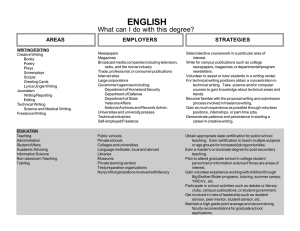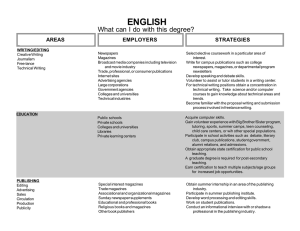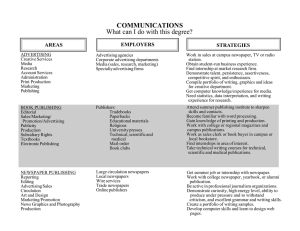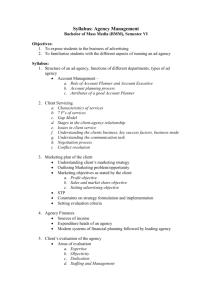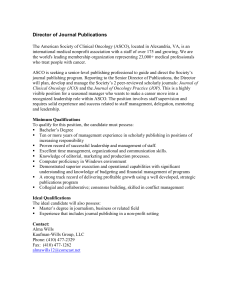ENGLISH What can I do with this degree? STRATEGIES AREAS
advertisement
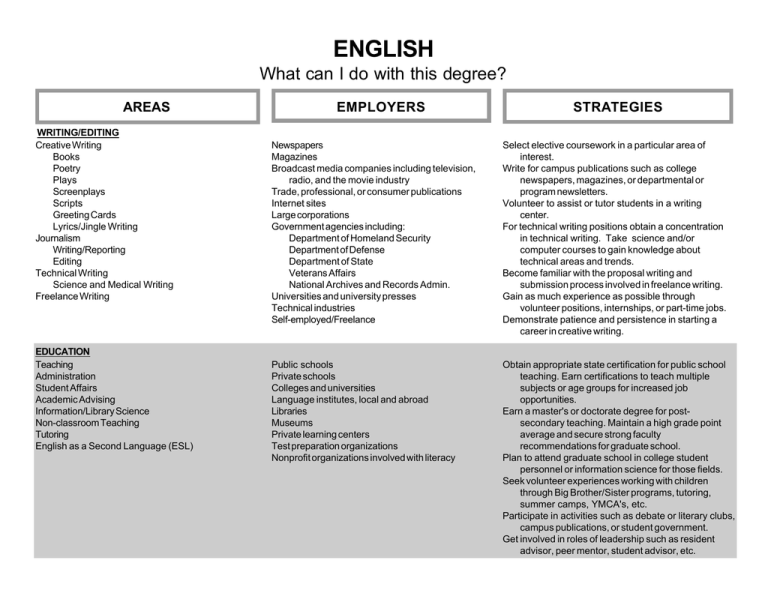
ENGLISH What can I do with this degree? AREAS WRITING/EDITING Creative Writing Books Poetry Plays Screenplays Scripts Greeting Cards Lyrics/Jingle Writing Journalism Writing/Reporting Editing Technical Writing Science and Medical Writing Freelance Writing EDUCATION Teaching Administration Student Affairs Academic Advising Information/Library Science Non-classroom Teaching Tutoring English as a Second Language (ESL) EMPLOYERS STRATEGIES Newspapers Magazines Broadcast media companies including television, radio, and the movie industry Trade, professional, or consumer publications Internet sites Large corporations Government agencies including: Department of Homeland Security Department of Defense Department of State Veterans Affairs National Archives and Records Admin. Universities and university presses Technical industries Self-employed/Freelance Select elective coursework in a particular area of interest. Write for campus publications such as college newspapers, magazines, or departmental or program newsletters. Volunteer to assist or tutor students in a writing center. For technical writing positions obtain a concentration in technical writing. Take science and/or computer courses to gain knowledge about technical areas and trends. Become familiar with the proposal writing and submission process involved in freelance writing. Gain as much experience as possible through volunteer positions, internships, or part-time jobs. Demonstrate patience and persistence in starting a career in creative writing. Public schools Private schools Colleges and universities Language institutes, local and abroad Libraries Museums Private learning centers Test preparation organizations Nonprofit organizations involved with literacy Obtain appropriate state certification for public school teaching. Earn certifications to teach multiple subjects or age groups for increased job opportunities. Earn a master's or doctorate degree for postsecondary teaching. Maintain a high grade point average and secure strong faculty recommendations for graduate school. Plan to attend graduate school in college student personnel or information science for those fields. Seek volunteer experiences working with children through Big Brother/Sister programs, tutoring, summer camps, YMCA's, etc. Participate in activities such as debate or literary clubs, campus publications, or student government. Get involved in roles of leadership such as resident advisor, peer mentor, student advisor, etc. (English, Page 2) AREAS PUBLISHING Editing Advertising Sales Circulation Production Publicity Marketing Promotion Administration ADVERTISING Creative Services Copy Writing Art Direction Account Management Media Account Planning Production EMPLOYERS STRATEGIES Trade publishing Special interest magazines Trade magazines Association magazines Sunday newspaper supplements Educational publishing Religious books and magazines Professional and scholarly publishing University presses Independent publishers Alternative media publishers including: E-books Audiobooks Obtain an internship in the publishing industry. Participate in a summer publishing institute. Develop word processing, editing, and desktop publishing skills; build additional technical skills if working in an online environment. Gain experience by writing for student publications such as the newspaper, creative writing magazines, the yearbook, etc. Conduct an informational interview with or shadow a professional in the publishing industry. Look for positions with local dailies and alternative weeklies in the community. Volunteer to write or edit publications with local nonprofit organizations to gain experience. Develop extensive grammar and language skills. Be prepared to relocate to cities with a publishing presence. A large majority of opportunities exist in New York City. Research the publishing industry to learn more about career ladders. Advertising agencies In-house agencies of large companies Demonstrate talent, persistence, assertiveness, and enthusiasm. Be prepared to start in an entry-level position. Obtain strong statistics background for market research positions. Create a portfolio of writing showing originality and imagination for creative positions. Gain knowledge of various media, contemporary tastes, and trends. Obtain experience with campus newspaper, TV, or radio. Participate in sales and promotions for student organizations or private businesses. Complete an internship in a market research firm or advertising agency. Supplement curriculum with courses in business (marketing, economics, mathematics), art, or graphic design. (English, Page 3) AREAS PUBLIC RELATIONS Account Coordination Writing/Editing Media Relations Account Management BUSINESS Management Sales Marketing Human Resources Insurance Claims Underwriting LAW Law Assistance Prosecution Defense Contractual Corporate Nonprofit or Public Interest Government Mediation Lobbying EMPLOYERS STRATEGIES Public relations firms Advertising agencies In-house public relations departments Trade associations Colleges and universities Nonprofit organizations Government agencies Obtain internship or other relevant work experience to break into this field. Be prepared to start at the bottom and work towards higher levels. Develop strong research skills, public speaking ability, enthusiasm, and interpersonal skills. Supplement curriculum with business courses. Become an effective team member by working on group projects for campus organizations. Volunteer to write publications for nonprofit or student organizations. Business organizations including banks, real estate agencies, insurance firms, and large and small corporations Retailers including department, grocery, drug, specialty, variety, and book stores Obtain a business minor. Gain relevant experience through part-time jobs, internships, or volunteer work. Secure leadership roles in campus organizations and student professional associations. Seek experience as a financial officer or treasurer of a campus organization. Develop strong analytical and computer skills. Law firms Government agencies State and local government Corporations Public interest organizations Private practice Colleges and universities Participate in a debate or forensic team to hone communication skills. Develop strong research skills and attention to detail. Take courses in and gain experience with mediation and conflict resolution. Get involved with pre-law organizations. Obtain a summer or part-time job in a law firm. Plan to shadow an attorney to learn more about the field and various specialties. Complete special training requirements for paralegal positions. Attend law school and earn a JD to become an attorney. Maintain an excellent grade point average and secure strong faculty recommendations to gain law school admittance. Plan to take the LSAT. (English, Page 4) GENERAL INFORMATION • • • • • • • • • A bachelor's degree in English is sufficient for many entry level positions in business and industry. A major in English is also good preparation for continued graduate or professional training in areas such as English, law, political science/government, public administration, communications, and religious studies (i.e., seminary). Because English can lead to many different career paths, it is important to identify an area of interest and be planful about gaining the right skills, experience, and credentials to enter that field. Be prepared to be proactive, determined, assertive, and confident in order to secure freelance writing opportunities. Writers typically experience many rejections for each piece that is accepted for publication. Save samples of written work to be used for a portfolio. Cultivate other career opportunities in order to supplement a freelance writing income. Obtain additional areas of expertise such as journalism, broadcasting, technical writing, or politics for specialized positions. For careers in advertising or public relations be prepared to begin in an entry-level position. Appropriate teacher certification is required for public school teaching. A graduate degree is required for teaching at the college or university level. Conduct informational interviews or shadow professionals in careers of interest to learn more about their jobs. Join relevant professional associations. Attend their conferences and read their journals. © 1992 The University of Tennessee Prepared by the Career Planning staff of Career Services at The University of Tennessee, Knoxville. (1992, Revised 1999, 2004, 2006) UTK is an EEO/AA/Title VI/Title IX/Section 504/ADA/ADEA Employer
